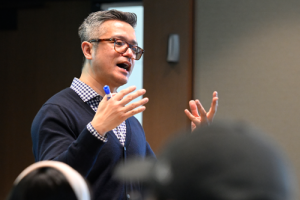Eyeing Life Through an Economist’s Lens
Published March 27, 2025
 Oh, to see the world through the eyes of Ou Hu.
Oh, to see the world through the eyes of Ou Hu.
He advocates for anyone, but most certainly for his MS in Financial Economics program students, to realize and adopt an economic way of thinking about life. “What is your goal? What are you trying to maximize?” For as Hu sees it, most everything in life is about economics and the decisions one makes based on what is available to them. This global mindset, one he is personally and unapologetically passionate about, has formed his vision for this Johns Hopkins University program.
“Economics, in a nutshell, is about the efficient allocation of limited resources to arrive at the best solution,” Hu said. “Think about it. At every level – personal, business/corporate, government, and international – it is all about weighing costs and benefits. You make decisions every minute of every day, and the time that you use to make these decisions is itself a limited resource. My goal for the program is to teach our students about weighing supply and demand, costs and benefits, in their decision-making, but also how to think, how to learn, how to walk the walk, not just talk the talk. We don’t give them fish. We teach them how to fish. When they graduate, our students are equipped to bring what they have learned to any corner of the world.”
The Hard and Soft of It
Hu earned his master’s and PhD in economics from West Virginia University and launched the program in January 2023 as its inaugural director. Built upon a former area of concentration in AAP’s applied economics program, students have the option to study online or on-site at the Johns Hopkins Bloomberg Center in Washington, D.C. The program seeks to advance not only the hard skills of financial economics but also the requisite soft skills that lead to success.
The program, which includes micro and macro theoretical foundations and essential econometric skills, also introduces courses specifically designed to analyze the financial market and the related policy that addresses financial issues in the economy. Students will leave with industry-desirable hard skills that address critical knowledge and data analytics applicable in both the private and public sector. Under Hu, the program also has placed emphasis on the human values of communication and marketing, especially as the integration of artificial intelligence and robotics makes some jobs obsolete.
“Someone can have a mastery of hard skills, but it doesn’t mean that they can communicate the idea and insights garnered from the data analytics to an audience,” Hu said. “It is important that our students leave with soft skills to advance themselves in the job market. It is infinitely more important to be able to communicate ideas with other human beings effectively. The combination of both hard and soft skills is what helps Johns Hopkins students stand out and succeed.”
Factoring in Faculty
His vision’s emphasis on the application of theory is delivered by what Hu considers the strongest asset of the program, a versatile faculty who bring varied expertise and experience to their classrooms. From their Washington, D.C, base, many faculty also serve as full-time employees in local government agencies and financial institutions, including the International Monetary Fund, the Federal Reserve, the Congressional Budget Office, and the World Bank, among others.
“I have never seen, in my 20-year teaching career, such a group of accomplished and respected industry experts who are now educators.” Hu said. “There is such a wealth of knowledge among my colleagues, and this is a treasure that our students can benefit from. We are always seeking to learn more about what industry is looking for so that we can develop our curriculum accordingly. I have also never seen any similar master’s level program that offers such a wide array of courses. Our program allows our students to customize and tailor their course plans according to their interest and career goals. This is truly an advantage. Our faculty enjoy serving our students, enriching their lives intellectually, and helping them achieve their academic and professional goals.”
International Appeal
This program’s STEM designation allows international students on F-1 visas to apply for an additional 24 months of employment in the United States. The designation, and its related job experience, Hu explains, is an obvious added value to the degree for international students but is also of benefit to domestic students.
“We are global citizens. Our students know that, and our expansive course offerings reflect that,” Hu said. “We are all part of the global community, and it is important to recognize that everyone is both contributing to and benefiting from the community. One of the strengths of our program is that it allows for an interaction with students from different backgrounds and life experiences, from other parts of the world, and a mutual opportunity to connect and learn from each other. Why do you think this way? Why do I think that way? We don’t have to all 100-percent agree, but it is important to hear different voices and perspectives and to respect each other’s opinions.
“Our students are eager to learn, and our faculty are equipped to address trending economic issues that emerge daily, whether it is interest rates, taxes, or inflation,” he said. “That is what makes financial economics such an attractive, dynamic discipline. Our program provides a wealth of knowledge and the opportunity for real-world interactions for a diverse group of students who truly come away with a global economic perspective.”
See your future in JHU’s MS in Financial Economics program? Apply now to learn from industry leaders like Program Director Ou Hu.